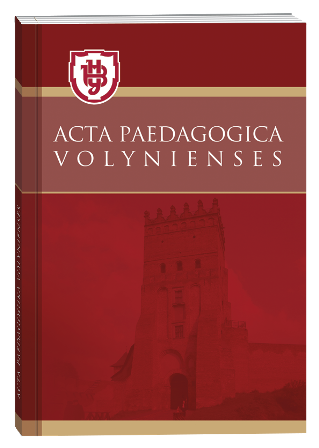METHOD OF FORMATION OF LEARDERSHIP QUALITIES OF PRIMARY SCHOOL STUDENTS IN EXTRACURICCULAR ACTIVITIES
DOI:
https://doi.org/10.32782/apv/2022.4.11Keywords:
leader, leadership qualities, Primary School students, extracurricular activities, forms of extracurricular activitiesAbstract
The article highlights the method of formation of leadership qualities of Primary School students in extracurricular activities. The essence of the concepts «leader», «forms of extracurricular work»; the main aspects of leadership in Primary School is revealed. The statement that the younger school age is the most favorable period for the formation of leadership qualities is emphasized. It was noted that leadership in a children’s team has its own characteristics, which are determined by the child’s development according to the age period. The main qualities of a student-leader such as initiative, activity, determination, self-confidence, the ability to socialize, the ability to listen to the interlocutor and the readiness to perform tasks independently are determined. Cultivating leadership qualities of students is a process that involves the daily work of the teaching staff. The paper emphasises that the process of forming leadership qualities of schoolchildren should be organized and systematic. It has been found that the teacher must be an example of a true leader for students and be familiar with the methodology of developing leadership qualities. Special attention in this article is paid to description of different forms of extracurricular activities, because this is activity that provides opportunities to learn about schoolchildren, their characteristics, abilities and inclinations. The forms of extracurricular work, that contribute to the development of the leadership potential of students, are interrelated and complement each other such as competitions, quizzes, olympiads, quests, projects, thematic evenings, educational events, exhibitions of student creative works, trainings, student self-government, game activities, individual forms of work with children have singled out. The article provides examples of training, exercises and games. It was concluded that the method of forming leadership qualities of schoolchildren involves a combination of pedagogical influence and children’s own activity. Systematic, consistent implementation of various forms of extracurricular work contributes to the formation of leadership qualities of Primary School students.
References
Алфімов Д. В. Лідерські якості особистості школяра. Педагогіка формування творчої особистості у вищій і загальноосвітній школах : зб. наук. пр. Класич. приват. ун-т. Запоріжжя, 2013. Вип. 33. С. 446–451.
Бокова І. С. Формування позитивних лідерських якостей молодших школярів у процесі проєктної діяльності. URL: http://ekhsuir.kspu.edu/bitstream/handle/123456789/13089/Bokova_pedfak_2020.pdf?sequence=1&isAllowed=y
Глінчевська Я. Роль учнівського самоврядування в школі. Директор школи, ліцею, гімназії. 2009. № 5. С. 74–79.
Гущина Н. І., Орлова Т. Г., Кондратова Л. Г. Нова українська школа: організація позаурочної діяльності в початковій школі на засадах партнерської взаємодії учасників освітнього процесу : навч.-метод. посіб. К. : Видавничий дім «Освіта», 2021. 160 с.
Єфіменко С. М. Виставка результатів учнівської творчості: організація, підготовка, презентація : навчально-методичний посібник. К. : КЗ «КОІППО імені Василя Сухомлинського», 2016. 76 с.
Клепко С. Ф., Литвинюк Л. В. Формування лідерської компетентності в школі: навч. посібн.-довідн. Полтава : ПОІППО, 2012. 270 с.
Махновець Ю. А. Тренінг у неформальній освіті вчителів Нової української школи. Естетика і етика педагогічної дії: зб. наук. пр. Ін-т пед. освіти і освіти дорослих НАПН України, Полтав. нац. пед. ун-т імені В. Г. Короленка. 2018. Вип. 18. С. 172–182.
Суровицька М. Вплив гри на розвиток особистості молодших школярів. Молодь і ринок. 2014. № 2 (109). С. 170–173.
Швець О. І. Алгоритм підготовки і проведення виховного заходу як основної організаційної форми виховання. URL: http://ppdut.pl.ua/images/content/viddilu/informatsijno-metodichnij/2020-2021/%D0%A8%D0%9F%D0%9C_-__2020%D1%80._compressed.pdf







